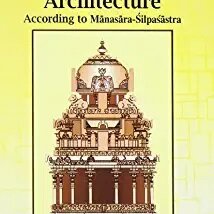Dr. Prasanna Kumar (P.K.) Acharya (1890, Calcutta, India — ) was an Indian scholar, translator, Sanskritist and historian of architecture who published the first complete edition and translation into English of the Manasara Shilpa Shastra (मानसार शिल्पशस्त्र), or Manasara, the ancient Indian treatise on architecture (or on “essence of measurement”, as he translated, since māna means ‘measurement’ in Sanskrit and sara ‘essence’, of which he discovered the complete manuscript (70 chapters) at the start of the 20th century.
From 1927 to 1946, P.K. Acharya published his monumental Indian Architecture: According To Manasara-Silpasatra (Manasara Series), a collection of seven volumes covering the classification of building techniques, sculptures, representations of deities, and more. Volume I: Dictionary of Hindu Architecture (1927); Vol. II: Indian Architecture According to Manasara Silpasatra (1927); Vol. III: The Manasara Manuscrit with Critical Notes (1934); Vol. IV: Architecture of Manasara — Translation in English (1934); Vol. V: Architecture of Manasara– Plates (Architectural and Sculptural) (1934); Vol. VI: Hindu Architecture in lndia and Abroad (1946); Vol. VII: An Encyclopaedia of Hindu Architecture (1946).
Paradoxically, little is known of his life. He obtained his MA in Calcutta, his PhD from Leyden University, and was Head of Oriental Studies Department and Professor of Sanskrit at the University of Allahabad, India. Presenting his work, Dr.C. Y. Chintamani remarked that he had to underake “extensie tours in company with trained architects and engineers, involving great expenditure of time, money and convenience, from Landikotal on the borders of Afghanistan to Ramesvaran in the south, from Mohenjodaro in Sindh to Shillong in Assam, in order to examine ancient monuments throughout the country, including the cave-temples of Western and Central India, the monuments of the Indian States in Rajputana and Hyderabad, the hill temples of Kedarnath, Badrinath, Tunganath, etc…An encyclopaedic dictionary has had to be compiled for the first time.”

